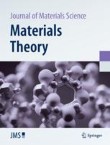The advance of multicomponent and high entropy represents a fantastic challenge as their multiple possible functions depend on a myriad of factors related to material microstructure, preparation and chemical composition. Materials science provides only hints to a possible theory for predicting the behavior, mechanical or/and multi-physics, of such complex alloys. Material informatics approaches try to bridge microstructural features of solids with their mechanical or/and multi-physics response, but they are confronted to the high level of complexity of microstructures and microscopic processes involved in materials. However, new machine learning approaches inspired from combinations of statistical physics and data science have emerged. The objective of this Special Issue is to gather interdisciplinary original contributions as well as reviews of recent advances in data science approaches to this rapidly growing field.
Submission deadline
30 November 2022
Guest Editors
Stefanos Papanikolaou, National Centre for Nuclear Research, Poland
Mikko Alava, National Centre for Nuclear Research, Poland
Submission instructions
Authors must read and follow the submission guidelines for Materials Theory available here prior to submitting to the journal. During the submission process, they should select the name of the collection from the dropdown menu.
Article-processing charge and funding
Springer Nature has numerous agreements around the world to help authors fund the article-processing charge (APC) in Materials Theory. Please visit our institutional agreements page for more information.
If you are not covered by any of the above, please visit our funding support page as you may have access to funds via your institution.For authors that do not have any access to funds, Springer Nature will consider requests for waivers on a case-by-case basis for cases of financial need. For more information, see here (under "Article-processing charges").
Springer Nature offers APC waivers to papers whose corresponding authors are based in countries classified by the World Bank as low-income economies (for the current list, see here).
